Papaya Benefits: 38 Health, Skin, & Hair Boosters
This versatile tropical fruit is the perfect companion on the journey to a healthier you.
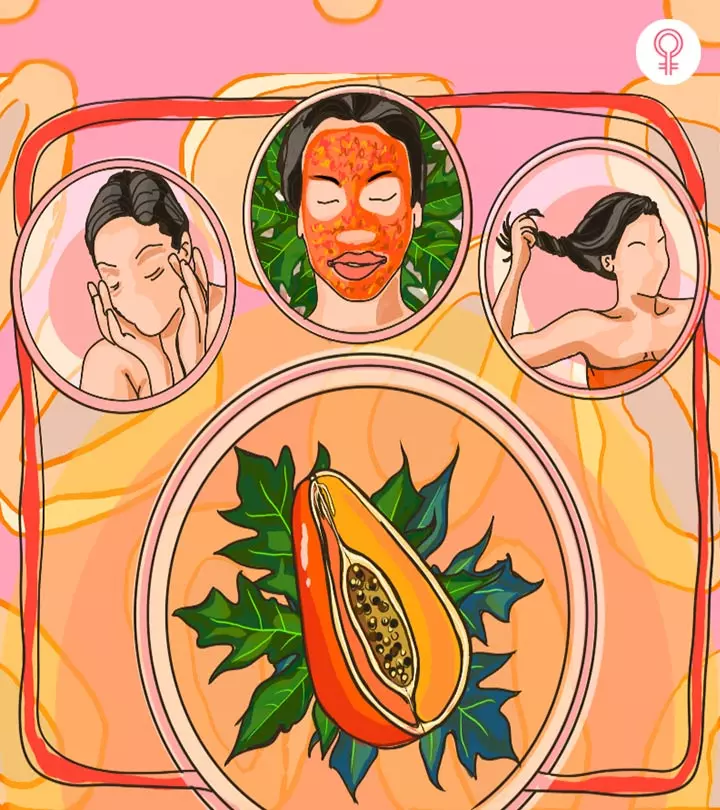
Image: StyleCraze Design Team
While you may or may not like the taste of papaya, you should be aware of the several important ways papaya benefits your health and immunity. There are certain fruits and vegetables in nature that nourish you from within and help you alleviate certain common health concerns. Papaya is one such fruit that has significant benefits whether eaten raw, ripe, or cooked. One small papaya contains about 300% of the recommended daily value of the immune-boosting vitamin C. It is also rich in beta-carotene and antioxidants that protect your body from free radical damage and boost your immunity and skin and hair health.

Continue reading to know more about papaya benefits and how to include this fruit in your diet.
 Know Your Ingredient: Papaya
Know Your Ingredient: PapayaWhat Is It?
An oval-shaped, soft, and orange fruit that contains black seeds and has a sweet taste.
What Are Its Benefits?
It moisturizes the skin, boosts hair growth, reduces menstrual cramps, and lowers the risk of cancer.
Who Can Use It?
Anyone can consume it except people with a papaya allergy and on thyroid and blood thinning medications.
How Often?
You can consume 1 full bowl of papaya daily.
Caution
Avoid consuming papaya if you are pregnant or breastfeeding. Overconsumption may cause diarrhea, very low blood sugar, and skin irritation.
In This Article
What Is Papaya?
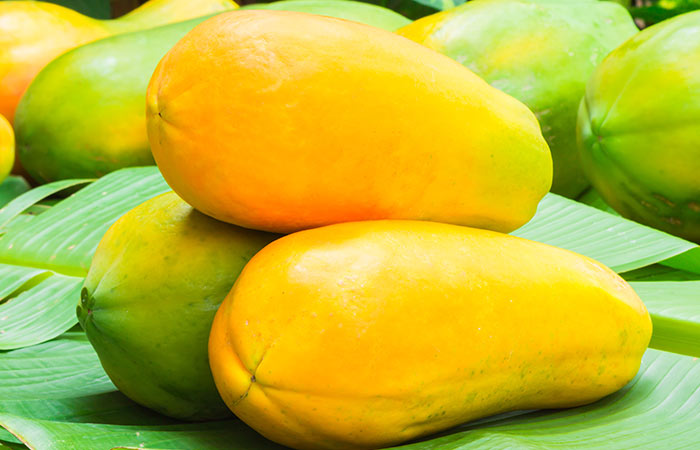
Scientific Name – Carica papaya
Origin – Central America and Southern Mexico
Other Names – Fruit of the Angels (by Christopher Columbus), Papita (Hindi), Boppayi Pandu (Telugu), Pappali (Tamil), Omakaya (Malayalam), Pappayi Hannu (Kannada), Papaiya (Gujarati), and Papai (Marathi)
Native to the tropical areas of Central America and Southern Mexico, papayas have slowly and steadily attained popularity all around the world. They are used in a number of forms – ripe, unripe, and dried.
 Trivia
TriviaKey Takeaways
- Papaya contains papain, an enzyme with exfoliating properties.
- Papaya is also high in anti-aging vitamins A, C, and E.
- It can help to reduce pigmentation and even out your skin tone.
- Papaya’s antioxidants can help fight free radicals to protect the skin from damage.
- Perform a patch test with papaya before using it, as some people may be allergic to it.
Papaya Properties
- High In Fiber – Papaya is a great source of dietary fiber (1). This nutrient absorbs toxins in the colon that can cause cancer and eliminates them from the body through bowel movements. Fibers from fruit and vegetables like papaya can nourish the beneficial communities of microorganisms within your body. Due to its rich fiber content, papaya has digestive enzymes that impart a beautiful glow to your skin from its enzymes. “However, raw papayas are a healthier alternative to ripe papayas as they are higher in fiber and low in sugar,” says Registered Dietician Bill Bradley.
- Rich In Vitamins And Minerals – Papaya contains abundant amounts of vitamin C, a potent antioxidant (2). It also aids wound healing, can reduce the risk of cancer due to oxidative stress, and boosts your immunity to fight common ailments such as cold and cough. This fruit is also replete with vitamin A and minerals like phosphorus, iron, potassium, copper, manganese, calcium, and magnesium. Vitamin A is required to maintain healthy vision while phosphorus is needed for good heart health.
- Rich In Antioxidants – The antioxidants present in papaya may help to strengthen immunity and eliminate free radicals that are hazardous to your health. This fruit contains more beta-carotene than carrots by weight.
- Abundant In Bioflavonoids – Also known as vitamin P, bioflavonoids are semi-essential nutrients that work as nature’s modifiers and respond to biological changes in the body. The bioflavonoids in papaya modify the reaction of the body to viruses, carcinogens, and allergens, thereby protecting it from harmful and life-threatening diseases.
This was about the medicinal properties of papaya fruit. Now learn about the benefits of papaya for your overall health.
Note: Consult a dermatologist before using papaya for your skin and/or hair.
Papaya Nutrition Facts
Check out here the nutritional value of papaya in detail.
| NUTRIENT | UNIT | VALUE PER 100 G | CUP 1″ PIECES 145G | CUP, MASHED 230G | FRUIT, SMALL 157G | FRUIT, LARGE 781G |
|---|---|---|---|---|---|---|
| PROXIMATES | ||||||
| Water | g | 88.06 | 127.69 | 202.54 | 138.25 | 687.75 |
| Energy | kcal | 43 | 62 | 99 | 68 | 336 |
| Protein | g | 0.47 | 0.68 | 1.08 | 0.74 | 3.67 |
| Total lipid (fat) | g | 0.26 | 0.38 | 0.60 | 0.41 | 2.03 |
| Carbohydrate, by difference | g | 10.82 | 15.69 | 24.89 | 16.99 | 84.50 |
| Fiber, total dietary | g | 1.7 | 2.5 | 3.9 | 2.7 | 13.3 |
| Sugars, total | g | 7.82 | 11.34 | 17.99 | 12.28 | 61.07 |
| MINERALS | ||||||
| Calcium, Ca | mg | 20 | 29 | 46 | 31 | 156 |
| Iron, Fe | mg | 0.25 | 0.36 | 0.58 | 0.39 | 1.95 |
| Magnesium, Mg | mg | 21 | 30 | 48 | 33 | 164 |
| Phosphorus, P | mg | 10 | 14 | 23 | 16 | 78 |
| Potassium, K | mg | 182 | 264 | 419 | 286 | 1421 |
| Sodium, Na | mg | 8 | 12 | 18 | 13 | 62 |
| Zinc, Zn | mg | 0.08 | 0.12 | 0.18 | 0.13 | 0.62 |
| VITAMINS | ||||||
| Vitamin C, total ascorbic acid | mg | 60.9 | 88.3 | 140.1 | 95.6 | 475.6 |
| Thiamin | mg | 0.023 | 0.033 | 0.053 | 0.036 | 0.180 |
| Riboflavin | mg | 0.027 | 0.039 | 0.062 | 0.042 | 0.211 |
| Niacin | mg | 0.357 | 0.518 | 0.821 | 0.560 | 2.788 |
| Vitamin B-6 | mg | 0.038 | 0.055 | 0.087 | 0.060 | 0.297 |
| Folate, DFE | µg | 37 | 54 | 85 | 58 | 289 |
| Vitamin B-12 | µg | 0.00 | 0.00 | 0.00 | 0.00 | 0.00 |
| Vitamin A, RAE | µg | 47 | 68 | 108 | 74 | 367 |
| Vitamin A, IU | IU | 950 | 1378 | 2185 | 1492 | 7420 |
| Vitamin E (alpha-tocopherol) | mg | 0.30 | 0.44 | 0.69 | 0.47 | 2.34 |
| Vitamin D (D2 + D3) | µg | 0.0 | 0.0 | 0.0 | 0.0 | 0.0 |
| Vitamin D | IU | 0 | 0 | 0 | 0 | 0 |
| Vitamin K (phylloquinone) | µg | 2.6 | 3.8 | 6.0 | 4.1 | 20.3 |
| LIPIDS | ||||||
| Fatty acids, total saturated | g | 0.081 | 0.117 | 0.186 | 0.127 | 0.633 |
| Fatty acids, total monounsaturated | g | 0.072 | 0.104 | 0.166 | 0.113 | 0.562 |
| Fatty acids, total polyunsaturated | g | 0.058 | 0.084 | 0.133 | 0.091 | 0.453 |
| Fatty acids, total trans | g | 0.000 | 0.000 | 0.000 | 0.000 | 0.000 |
| Cholesterol | mg | 0 | 0 | 0 | 0 | 0 |
| OTHER | ||||||
| Caffeine | mg | 0 | 0 | 0 | 0 | 0 |
What Is Papaya Good For?
Skin Benefits
- Moisturizes Skin
- Clears Pigmentation
- Reduces Wrinkles
- Reduces Under-Eye Dark Circles
- Helps Treat Eczema And Psoriasis
- Treats Melasma
- Removes Tan
- Controls Acne Breakout
Hair Benefits
Health Benefits
- Promotes Cardiovascular Health
- Prevents Macular Degeneration
- Boosts Immunity
- Heals Wounds
- Aids Digestion
- Has Anticancer Effects
- Prevents Arthritis
- Reduce Inflammation In The Lungs
- Treats Throat Disorders
- Treatment For Ringworm
- Helps In Muscle Tissue Renewal
- Activates Human Growth Hormones
- Helps Ease Menstrual Pain
- Helps Reduce Stress
- Aids Weight Loss
- Good For Diabetics
- Treats Piles
- Cures Vitiligo
- Prevents Irritable Bowel Syndrome (IBS)
- Treats Nausea And Motion Sickness
- Helps Increase Platelet Count
- Keeps Blood Pressure Under Control
- Used For Birth Control
- Good For Babies
- Good For Pregnant Women
- Treats Gout
- Helps Increase Lactation
Benefits Of Papaya For Skin
Papaya can improve your complexion courtesy of the active enzymes present in it, like papain.
It helps reduce pigmentation and controls acne breakouts and wrinkle formation. Read on to know the best papaya benefits for skin:
1. Moisturizes Skin
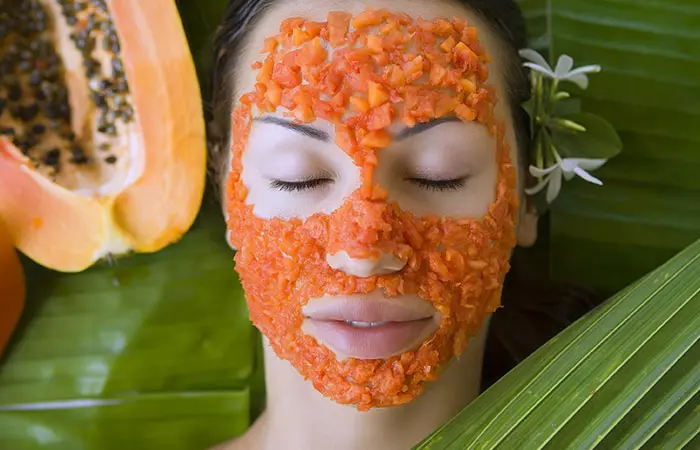
Papaya can be a boon for those with dry skin. Using a papaya face pack can make your skin soft and supple. Fermented papaya can assist in treating dry and flaky skin and hydrate it (3).
What You Need
- 1 tablespoon mashed papaya
- 1 teaspoon honey
What You Have To Do
- Mix the papaya and the honey.
- Apply the mask to your face. Keep it on for 30 minutes.
- Rinse with cold water.
Khichi, a blogger, shared how she used papaya for healthier and brighter skin in her video. She said, “I’ve been using papaya on my skin for several years and I’ve seen some amazing results (i).”
2. Clears Pigmentation
If a bout of acne has left you with scars, or if you are suffering from uneven pigmentation, papaya contains carotenoid that can help reduce it. Papaya has antioxidant properties that help clear blemishes and pigmentation (4). Also, the beta-carotene, enzymes, and phytochemicals present in papaya help promote fairness. The enzyme papain, along with the alpha-hydroxy acids, acts as a powerful exfoliator and dissolves inactive proteins and dead skin cells (5). This, in turn, can make your skin lighter and softer.
What You Need
- 1 tablespoon papaya juice
- Cotton balls
What You Have To Do
- Soak the cotton balls in the papaya juice.
- Apply this to the affected areas.
- Keep it on for 15 minutes and rinse with cold water.
You can also make your skin tone lighter by using the method below:
What You Need
- 1/4 cup papaya pulp
- 1 tablespoon honey
- 1/2 teaspoon fresh lemon juice
What You Have To Do
- Mash the papaya pulp to make a lump-free puree.
- Add lemon juice and honey to the mix and blend well.
- Wash your face and pat it dry.
- Apply this paste as a face mask and leave it on for 15 to 20 minutes.
- Use lukewarm water to gently wipe off the mask.
- Rinse with cold water and pat dry.
- Follow this process once a week for fair skin.
3. Reduces Wrinkles

Aging and fine lines can cause stress, because a firm skin is everyone’s goal, right? Papaya peel might act as a stress relief in this case because it can help reduce the signs of aging and aid skin rejuvenation. Some claim it to be as effective as Retin-A. The peel contains β-carotene that removes dead cells from the surface of the skin (6). This helps remove wrinkles and age spots.
What You Need
Papaya peel
What You Have To Do
- Rub the papaya peel all over your face and neck.
- After 20 minutes, rinse with cold water.
4. Reduces Under-Eye Dark Circles
Using green papaya pulp on dark circles is a good way to get rid of them. Since it is a natural bleaching agent, green papaya helps erase skin discoloration.
What You Need
1/4 cup mashed green papaya
What You Have To Do
- Apply the mashed paste on your dark circles and leave it on for at least 10 minutes.
- Rub your skin gently with your fingertips and then wipe the paste off with a clean cloth.
- Wash with lukewarm water.
- Do this daily to banish those dark circles.
5. Helps Treat Eczema And Psoriasis

Our ancestors used papaya to heal scars, burns, and skin diseases.
As discussed earlier, the enzyme papain in papaya and AHAs exfoliate dead skin cells to cure skin impurities (5). When mashed and applied directly on the affected area, raw papaya can help prevent itching and redness. You can also have a glassful of papaya milk daily to assist in the treatment of skin diseases like eczema and psoriasis.
6. Treats Melasma
Papaya can help treat melasma due to its exfoliating properties. Apply ripe or unripe papaya on pigmented skin to make it smooth and supple and impart an even skin tone.
7. Removes Tan
This exotic fruit contains vitamins A and C in abundance. In combination with papain, they help lighten your skin (7). Use the below method to get rid of that annoying tan within a few uses:
What You Need
- 4 cubes ripe papaya
- 1 tablespoon turmeric powder
- 1 tablespoon honey
What You Have To Do
- Mash the raw papaya cubes.
- Add turmeric powder and honey.
- Mix well to form a thick paste.
- Apply it on your clean face evenly and leave it on for 20 to 30 minutes.
- Wash it off with lukewarm water.
- Use this paste once a week for healthy and glowing skin.
8. Controls Acne Breakout
Papaya treats acne and prevents future breakouts as well.
Again, the proteolytic enzyme papain makes papaya an effective treatment for acne. A study published in the Giornale Italiano di Dermatologia e Venereologia journal tested a new gel for treating mild to moderate facial acne. The gel contained a combination of hydroxypinacolone retinoate (0.1%), retinol in glycospheres (1%), and papain in glycospheres (2%). Ninety-eight participants used it once daily for 12 weeks. Results from 94 participants showed a 41% reduction in acne severity and a 40.8% decrease in total lesions. Only about 15% experienced mild skin irritation, like dryness or redness, and none stopped treatment because of it (8).
Apart from the fruit itself, the leaves, skin, and seeds also contain certain enzymes that can diminish scars and blemishes.
Use the thick and even pulp of a ripe papaya as a face mask and leave it on for 15-20 minutes. Wash this paste with cold water. With regular application, you will notice a marked difference.
Note: You can also use the juice of raw papaya on the acne affected area to reduce inflammation and soothe soreness caused by acne.
Papaya Benefits For Hair
Use papaya to foster hair health. Keep reading to know the amazing papaya fruit benefits for hair:
9. Stimulates Hair Growth

This is one of the little-known benefits of papaya. Papaya has folic acid that helps improve circulation to the hair follicles and promotes hair growth. However, research suggests that while enough folic acid in your body is important for your overall health, it does not seem to have a strong connection to hair loss (9).
Include papaya in your meals, along with other fruits for hair growth, and get ready to flaunt long and healthy hair.
10. Controls Dandruff
Even the seeds of papaya can help us. In fact, one of the best papaya seeds benefits is that they can help reduce dandruff when used in a hair pack.
One of the main causes of dandruff is a fungal infection. The antifungal properties of papaya seeds help in controlling and preventing dandruff. A study published in the Indian Journal of Pharmaceutical Sciences explored the phytochemical and antifungal properties of Carica papaya (papaya) seed extracts. Certain extracts demonstrated activity against Aspergillus flavus, Candida albicans, and Penicillium citrinium, suggesting the seeds’ natural antifungal potential (10).
What You Need
½ papaya with the seeds intact
What You Have To Do
- Peel the papaya and blend the pulp and the seeds to make a smooth paste.
- Massage the paste into your scalp and apply it to the rest of your hair as well.
- Leave it on for one hour and then shampoo as usual.
11. Conditions Hair
Papaya can restore the life of your hair and make it soft and hydrated.
Due to its high vitamin A content, papaya regulates the production of sebum (11). Sebum is your body’s natural oil, and its balanced production keeps your hair conditioned without making it too greasy.
What You Need
- ½ ripe papaya
- ½ cup yogurt
What You Have To Do
- Remove the skin and the seeds of the papaya and blend till a smooth paste is formed.
- Add yogurt to the papaya paste and mix well.
- Apply this mixture to your hair, starting from the roots to the very ends.
- Keep it on for an hour and rinse using a mild shampoo.
Health Benefits Of Papaya
Did you know that there are a host of papaya health benefits to your heart, memory, digestive system, and eye health? Here’s how this amazing fruit can help you:
Papaya benefits your health in several ways. It may lower blood pressure levels, reduce the risk for common heart disorders and cancers, may help improve blood glucose levels, and may also promote digestion and wound healing. It also has the potential to aid in cancer prevention.
12. Promotes Cardiovascular Health
Papaya is one of the healthiest fruits available, and it can help keep your heart healthy.
This exotic fruit is rich in vitamins A and C. They help prevent the oxidation of cholesterol, which stops it from clogging the blood vessels (12). This helps reduce the risk of heart attacks.
13. Prevents Macular Degeneration
Macular degeneration is the gradual loss of vision that usually affects the elderly. Papaya can help stop this loss in vision.
Papaya has an antioxidant called zeaxanthin that filters out rays that harm the retinas (13). This reduces the risk of macular degeneration.
Additionally, papayas contain vitamin A and flavonoids like beta-carotene, cryptoxanthin, and lutein. These keep the mucus membranes in the eyes healthy and protect them from damage. A review published in the Antioxidants journal highlighted the important role of carotenoids, like β-carotene, lutein, and zeaxanthin, in maintaining eye health. These natural antioxidants, found in colorful fruits and vegetables, help protect the eye from oxidative stress, light-induced damage, and inflammation. The review discusses how these compounds may help prevent cataracts, age-related macular degeneration, and diabetic retinopathy (14).
So, it is a good idea to have a papaya daily to potentially improve your vision.
14. Boosts Immunity
Do you often fall sick? It is possible that you have low immunity.
No worries, eating papayas can boost your immune system.
Papaya is rich in antioxidants that scavenge the free radicals that have a negative impact on your immune system (15). This should theoretically boost your immunity (along with adequate sleep, exercise, hydration, stress management, and overall diet quality).
15. Heals Wounds
Applying crushed papaya seeds to wounds can help in their faster healing.
Papaya seeds show significant antimicrobial activity that helps kill the bacteria in the wound and promotes faster healing (16).
The juice you get from green papayas is a wonderful natural remedy to prevent swelling and pus formation when applied to wounds.
16. Aids Digestion
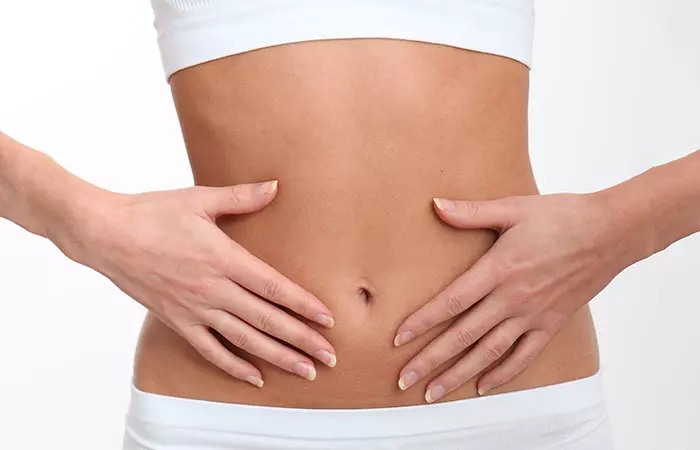
Papaya can help keep your digestive system healthy. In folk medicine, it was used to treat all kinds of stomach ailments, including indigestion, heartburn, acid reflux, and stomach ulcers.
Papaya is a rich source of dietary fiber, which is very good for your digestive system (17). Also, as explained earlier, papaya contains a protein-dissolving enzyme called papain that eases many stomach ailments and aids digestion.
17. Has Anticancer Effects
Studies show that papaya seed extracts can have chemotherapeutic effects.
Papaya seeds are rich in flavonoids that can reduce the risk of cancer by arresting the development of cancerous cells (18).
18. Prevents Arthritis
Arthritis is a painful disorder that causes inflammation in the joints.
Papaya has anti-inflammatory properties that can help reduce the pain that results from arthritis (19).
19. Reduce Inflammation In The Lungs
Smokers, both active and passive, can develop lung inflammation. Papayas have vitamin A that can help prevent and reduce this inflammation, though anyone who smokes should seek help to quit.
Drink a glass of papaya juice if you experience bouts of coughing.
20. Treats Throat Disorders

When green papaya juice is mixed with honey, it can help reduce the inflammation of tonsils – a symptom of diphtheria and other problems related to the throat. It helps dissolve the membrane and prevents the spread of infection.
21. Treatment For Ringworm
Papaya milk contains carotene, and this compound, if consumed daily, can help treat ringworm infection when coupled with traditional medical interventions (15). Thanks to papaya milk’s anti-inflammatory properties, it eases inflammation and redness caused by the infection.
22. Helps In Muscle Tissue Renewal
Papaya milk not only revitalizes your body but also helps in the renewal of muscle tissues. This is because it is a rich source of protein, which is required for optimal muscle health and repair.
23. Activates Human Growth Hormones
Papaya nourishes the endocrine system and promotes the production of arginine in the body. Arginine is a type of essential amino acid that is known to activate the human growth hormones (HGH) (20). These hormones play a key role in rebuilding bones, muscles, skin, and liver cells, and promote overall cell rejuvenation.
24. Helps Ease Menstrual Pain

While menstruation is a natural process and a part of every woman’s life, the painful cramps Aunt Flo brings along every month can leave you tossing and turning in bed until the pain goes away. Over the counter drugs can help to a certain extent, but they can mess with your menstrual cycle when taken on a regular basis. Hence, opting for a natural solution like papayas is recommended.
Papayas are often recommended to those who have painful and irregular periods.
The papain enzyme helps regulate and ease the flow of blood during menstruation (3). Anecdotal evidence suggests that papaya also stimulates the production of estrogen, thereby helping to assist in normalizing the period cycle.
25. Helps Reduce Stress
We all face stress on a daily basis in different areas of our life – relationships, work, kids, etc. Having a plateful of papayas can aid stress relief. This sweet fruit contains active enzymes as well as vitamin C that can help restore your energy levels.
Several studies have shown that our body needs about 200 mg of vitamin C to regulate the flow of stress hormones, and one large papaya contains a whopping 476 mg of vitamin C!
26. Aids Weight Loss
Looking for a natural and effective way to lose weight? Snack on a bowl of papayas.
How many calories in papaya? Well, 100 grams of papaya contains only 43 calories – making it an ideal weight loss food. The fiber content in papaya will make you feel full and may regulate bowel movements. This may facilitate weight loss. The presence of powerful antioxidants can contribute to inflammation control, and obesity is associated with inflammation (21). Incorporating papaya for your weight loss diet can be a tasty and nutritious option.
27. Good For Individuals With Diabetes

Papaya is antidiabetic as it is low in sugar (only 11.3 grams in a cup of diced papaya) (22). It is ideally consumed alongside some fat and protein to balance the glycemic index.
Many studies have concluded that papaya extract can actually slow down the development of type-II diabetes, where the pancreas completely loses its ability to make and secrete insulin.
28. Treats Piles
Hemorrhoids (also called piles) are swollen and inflamed veins that are found in and around the rectum or anus.
Having papayas on a regular basis may soothe the swollen blood vessels in that area, offering relief from those painful hemorrhoids.
29. Cures Vitiligo
Approximately 1.5% of the world’s population is suffering from vitiligo – a condition where white patches appear on the skin. Papayas are one of the most effective home remedies to help mediate vitiligo.
Applying a paste of ripe papaya on the affected area will boost the melanin production, helping skin to restore to its normal color.
You can also consume papaya juice to aid the internal healing of vitiligo.
Note: You can use papaya juice instead of mashed papaya. It will be less messy to apply and easier to wash off.
30. Prevents Irritable Bowel Syndrome (IBS)
Papayas contain 12% fiber, with 60% of it being soluble fiber. This soluble fiber can help prevent the symptoms of IBS.
Papayas are also rich in a number of proteolytic (protein-digesting) enzymes that aid proper bowel movements (23).
31. Treats Nausea And Motion Sickness

Papaya is beneficial for pregnant women when it is consumed in small quantities (24). Anecdotal evidence suggests that it may help ease morning sickness, nausea, and motion sickness due to the presence of vitamins C and E and folate.
Note: Even though a small portion is unlikely to cause harm, consult your doctor before taking papaya for nausea and morning sickness if you are pregnant or breastfeeding.
32. Helps Increase Platelet Count
Consuming papaya and papaya leaf juice can help increase the platelet count of those suffering from dengue fever.
Use papaya plant in the following ways to cure dengue:
- Have papaya salad, or have a glass of fresh papaya juice with a dash of lemon juice twice or thrice a day.
- You can also extract fresh juice from papaya leaves using a mortar and pestle. Drink two tablespoons of it twice a day for aiding recovery.
33. Keeps Blood Pressure Under Control
Touted to be one of the ‘silent killers’, high blood pressure can be caused due to lifestyle and dietary factors like high sodium intake and less or no physical activity. Low levels of potassium in the body also lead to high blood pressure. 100 grams of papaya contains 182 mg of potassium, which is an essential mineral to keep your blood pressure under control (25).
As papaya is a good source of potassium, it is great for your kidney health, too. Registered Dietitian Bill Bradley says, “Potassium keeps the kidney healthy by cleaning out toxins deposited in it. Papaya seeds also contain flavonoids to keep the cells from degenerating.”
Potassium counteracts the effects of sodium, thus ruling out the chances of a sudden hike in blood pressure.
34. Used For Birth Control
Papaya fruit and seeds have been used as a form of birth control for ages, especially in the Indian subcontinent and some parts of Southeast Asia.
Women consume a large quantity of unripe green papaya to avoid pregnancy across the globe. It is also known to cause abortion when directly applied to the uterus.
Of course, papaya alone is not an effective birth control. Consult your physician to determine the ideal birth control method(s) for you.
35. Good For Babies

This easily digestible fruit is also considered to be good for babies, which is why it is one of the first foods introduced to them (31). It is usually introduced to infants when they are 7 to 8 months old.
Papaya assists proper bowel movement and keeps babies healthy and happy.
36. Good For Pregnant Women
As explained earlier, papaya is considered to be nourishing for pregnant women due to its high vitamin C, vitamin E, and folate content, but only when taken in moderate quantities (26). It helps relieve acidity, heartburn, constipation, and several other stomach disorders and promotes the growth of the fetus (27).
Many women consume a tonic made of ripe papaya, milk, and honey. This mixture is a rich source of nutrients for pregnant women and lactating mothers.
37. Treats Gout
Gout is caused by the accumulation of uric acid in the blood. This excess acid forms crystals, inducing swelling, redness, and pain in the joints.
Papaya may aid in symptom relief and treat gout. Papain is an enzyme found in papaya that is a natural anti-inflammatory agent (28).
38. Helps Increase Lactation

Lactating mothers may want to include raw papaya – a galactagogue – in their diets to improve breast milk production (29).
Raw papayas also act as sedatives and can help you relax and feed the baby with more calm.
These benefits of papayas are incredible. If you are wondering how to add the fruit to your daily diet, the following section is for you.
How To Eat A Papaya
While choosing papaya, look out for the ripe ones. Unripe papayas are usually bitter and odorless. You can choose papayas with orange skin and soft texture. However, do not choose the ones with excessively soft textures.
- Peel the skin of the papaya with a peeler.
- Scoop out the seeds and enjoy the soft flesh of the fruit.
- Some eat unripe papaya. It can also be made into a curry.
- Do not eat papaya seeds as they are bitter and poisonous.
Here are some other tips for papaya consumption you may follow:
- Pair ripe papaya slices with lime or lemon juice for a tangy touch.
- Consume it with yogurt and a drizzle of honey for a light dessert.
- Add it to fruit or green salads for a sweet and refreshing touch.
- Combine diced ripe papaya with coconut milk if you love tropical flavors.
- Dice it and freeze it to enjoy as a refreshing snack.
You can also create interesting recipes using papayas. Scroll down for some ideas.
Easy Papaya Recipes
Papaya Mango Smoothie
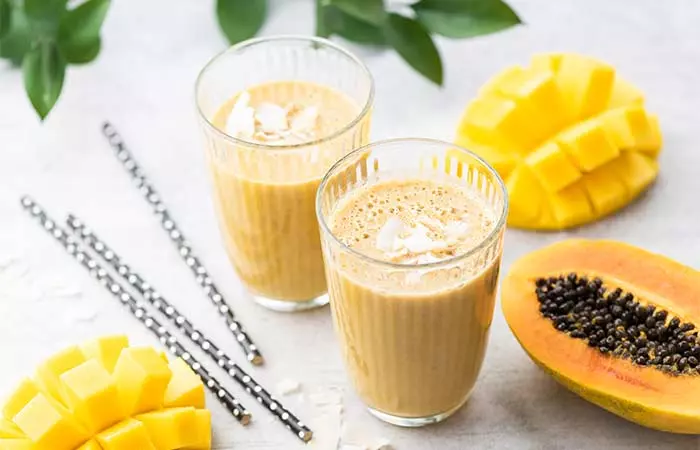
What You Need
- Coconut milk – 150 ml
- Ripe papaya – 250 grams
- Mango – 200 grams
- Greek yogurt – 1 cup
- Banana – 1 small
Method
- Place all the ingredients in a blender jar and blend until smooth.
- Pour into a glass and freeze for 15 minutes.
- You can add any fruit toppings to enhance the taste.
Papaya Ice Cream
What You Need
- Papaya – 250 grams
- Frozen Pineapple – 150 grams
- Coconut cream – 100 grams
- Medjool dates – 100 grams
- Vanilla extract – 1 tablespoon
Method
- Blend all the ingredients for 5 minutes.
- Transfer to a freezer-safe container and freeze for 2 to 4 hours.
- You can add dry fruit toppings or fruit toppings before serving.
Papaya Salsa
What You Need
- Ripe papaya – 250 grams (cut into cubes)
- Avocado – ½ cup
- Red onion – ½ diced
- Cilantro – 2 tablespoons
- Lemon juice – 2 tablespoons
- Salt – ¼ teaspoon
- Pepper – ¼ spoon
Method
- Place all ingredients in a large bowl and gently toss.
- Sprinkle lemon juice and cilantro over the salsa and give a gentle mix.
 Quick Tip
Quick Tip- You can store this in the refrigerator for a couple of days or it can be enjoyed within 24 hours after preparing (if not stored in the refrigerator).
Green Papaya Salad
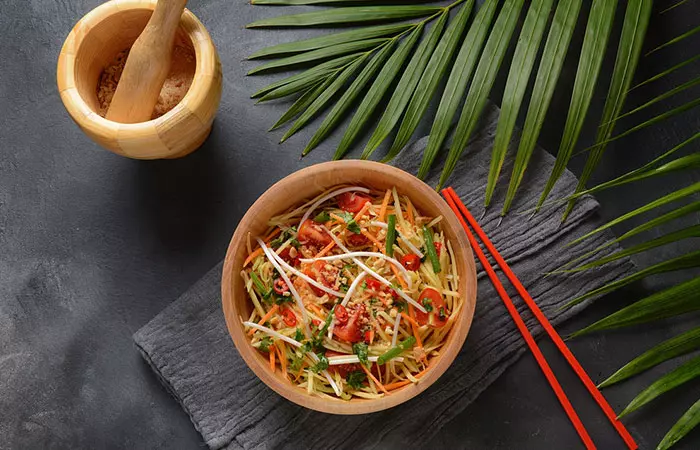
What You Need
- 1 green papaya, shredded into thin strips
- 2 garlic cloves, crushed
- 2 Thai bird eye chilies, crushed
- 2-3 cherry tomatoes, sliced
- 3 tablespoons of roasted peanuts
- 1 tablespoon of fish sauce
- ½ cup of dried shrimp
- 1 tablespoon of fresh lime juice
- 1 teaspoon of sugar
- 1 cup of shredded carrot
- 1 tablespoon of fresh cilantro
Method
- Add the shredded papaya, carrots, crushed garlic, chilies, dried shrimp, and cherry tomatoes in a large bowl.
- Mix fish sauce, fresh lime juice, and sugar in a separate bowl.
- Pour this dressing over the salad and toss everything together.
- Garnish with roasted peanuts and cilantro before serving.
Note:
For the vegetarian version, skip adding dried shrimp and replace fish sauce with soy sauce.
Selection And Storage
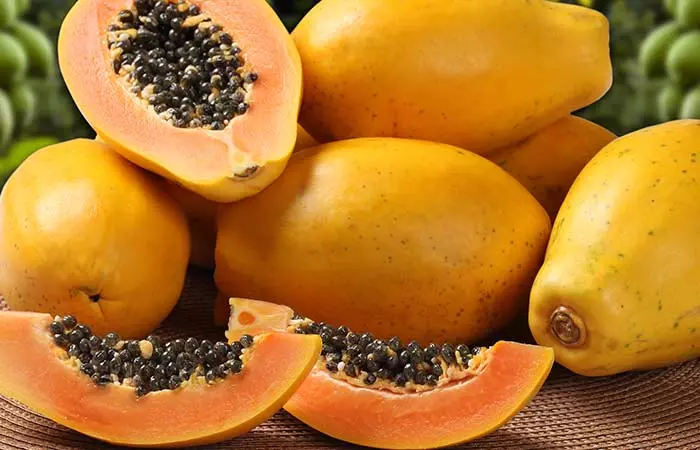
Papaya ripens even after it has been plucked. If it has reddish-orange skin, it means it is ripe, and should be consumed within a few days. Papaya that has yellow tinges on the skin needs a few more days to ripen.
Ripe papayas should be stored in the refrigerator. Once they have been sliced, they should be consumed within a day or two.
Possible Health Risks Of Eating Papaya
Though there are plenty of papaya health benefits, listed below are a few points you should keep in mind before consuming papayas:
- Papaya is considered to be safe when consumed in moderate amounts. But consuming unripe papaya may be harmful as it contains papain that can damage the esophagus and is linked with aspiration pneumonitis, an infection of the lungs(30).
- Pregnant and breastfeeding women should avoid consuming excessive papaya. Papaya contains unprocessed papain and high latex content that may poison the fetus, stimulate contractions, or cause congenital disabilities.
- Papaya can also cause allergic reactions, and anaphylaxis, in some people, which might happen due to the papain or latex in the
- People with diabetes and hypoglycemia should avoid consuming fermented papaya as it can reduce blood sugar way too much.
- Those using anti-blood clotting medication should consult their doctor before having papaya as it may interact with those medicines.
- Avoid overconsumption of papaya as it may have a laxative effect.
- Avoid consuming the black seeds of papaya as they contain traces of the enzyme carpine– a potentially toxic substance. Its overconsumption can cause paralysis or cardiac depression.
- The seeds of papaya may reduce sperm motility. Hence, people planning for pregnancy also shouldn’t consume papaya seeds (31).
- Benzyl isothiocyanate in papaya seeds is proven cytotoxic (32).
- The function of levothyroxine, which is used to treat thyroid issues, is impaired with the consumption of papaya (33).
Being aware of the risks and side effects of papaya can help you enjoy this fruit responsibly and avoid any potential issues.
Infographic: Health Benefits Of Papaya
Papaya fruit is rich in many beneficial nutrients. This fruit offers an array of health benefits when included as a part of your regular diet. Its benefits range from promoting skin health to cutting down the risk of cardiovascular diseases and cancer. This fruit is ideal for consumption by everyone.
The following infographic lists the various health benefits of eating papaya that you should know. Check it out now!
Some thing wrong with infographic shortcode. please verify shortcode syntax
Conclusion
The benefits of papaya are numerous, and they can be attributed to its vitamin C, beta-carotene, antioxidants, and fiber. Papaya can effectively manage dry skin, pigmentation, wrinkles, under-eye circles, eczema, tan, and acne. It also promotes hair health, cardiovascular health, immunity, and digestion – and reduces the risk of cancer, throat disorders, piles, and arthritis. However, excess intake may cause undesirable side effects. Refrain from consuming the black seeds of papaya as they may negatively affect cardiac health. Moderate consumption of papaya is advised to reap its benefits.
Learn about the health benefits and risks of eating papaya seeds. Discover what you need to know to make an informed decision. Scroll down to watch the video.
Frequently Asked Questions
What happens if you eat papaya every day?
Consuming moderate amounts of papaya every day can help boost your skin, hair, and overall health in many ways.
What is the best time to eat papaya?
You can have papaya as part of your breakfast or as a healthy snack to curb your hunger pangs between meals.
Is papaya good for fatty liver?
Yes. Papaya helps manage fatty liver by boosting the antioxidant levels in your body, reducing inflammation, and decreasing fat accumulation (34).
Does papaya thin blood?
Possibly not. Although scientific evidence regarding papaya’s anticoagulant properties is limited, its leaf extract has been found to boost platelet concentration as well as help in blood clotting (35).
Does papaya increase breast size?
Although some anecdotal evidence suggests that papaya may increase breast size, scientific evidence for the same is still lacking.
Can I rub papaya on my face?
Yes. Papaya is packed with vitamins, minerals, and antioxidants that may help rejuvenate your skin.
Illustration: Benefits Of Papaya For Skin, Hair, And Health
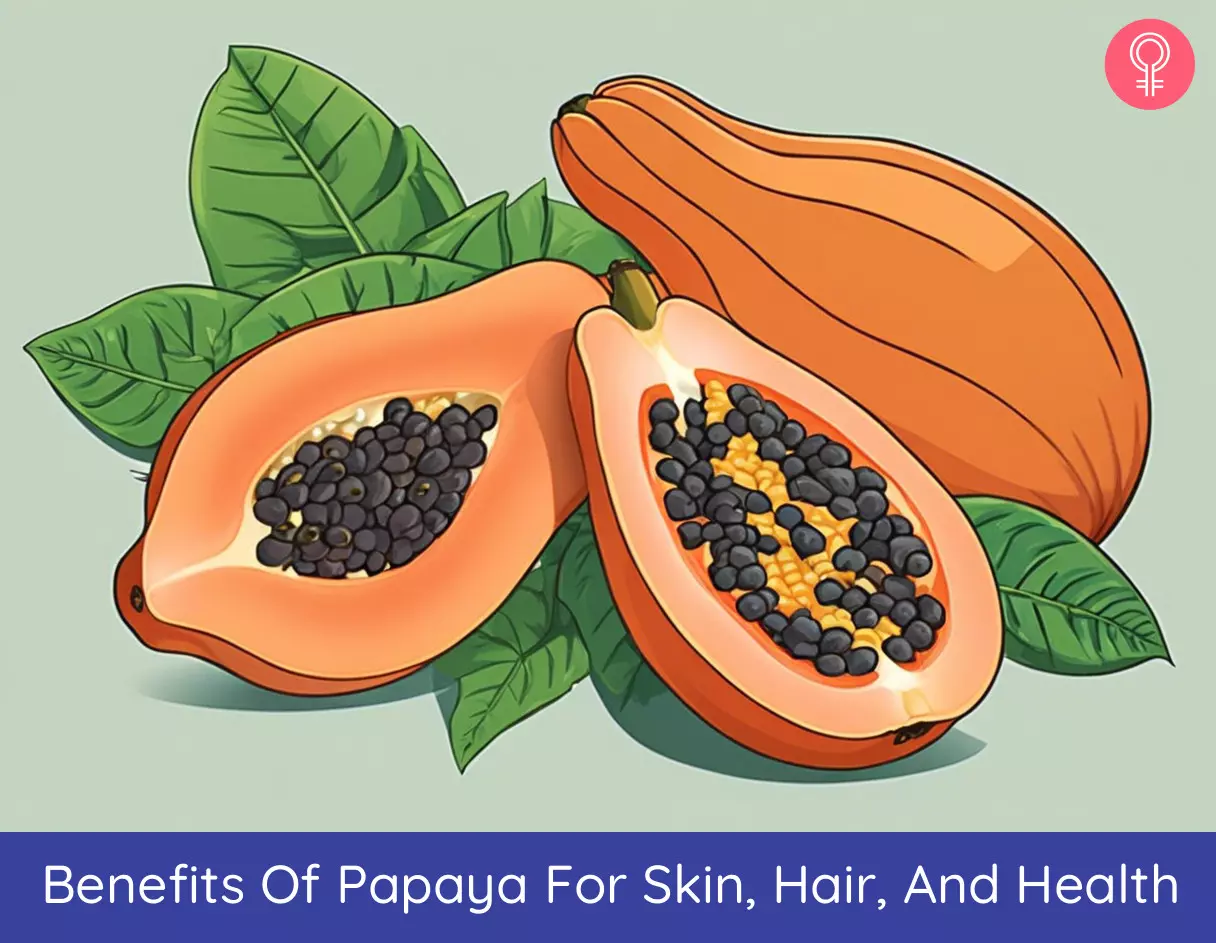
Image: Stable Diffusion/StyleCraze Design Team
Personal Experience: Source
StyleCraze's articles are interwoven with authentic personal narratives that provide depth and resonance to our content. Below are the sources of the personal accounts referenced in this article.
i. HOW I USE PAPAYA TO GET HEALTHY GLOWING SPOTLESS SKIN, YOUNGER, CLEARER AND WRINKLE FREE SKINhttps://www.youtube.com/watch?v=bS_W5o2Nihg
References
Articles on StyleCraze are backed by verified information from peer-reviewed and academic research papers, reputed organizations, research institutions, and medical associations to ensure accuracy and relevance. Read our editorial policy to learn more.
- Total antioxidant activity and fiber content of select Florida-grown tropical fruits
https://pubmed.ncbi.nlm.nih.gov/16968105/ - Vitamin C
https://ods.od.nih.gov/factsheets/VitaminC-Consumer/ - Benefits of Fermented Papaya in Human Health
https://www.ncbi.nlm.nih.gov/pmc/articles/PMC8870802/ - The potential role of antioxidants in mitigating skin hyperpigmentation resulting from ultraviolet and visible light-induced oxidative stress
https://pubmed.ncbi.nlm.nih.gov/30198587/ - Hydroxy Acids the Most Widely Used Anti-aging Agents
https://www.ncbi.nlm.nih.gov/pmc/articles/PMC3941867/ - Bioactive Compounds for Skin Health: A Review
https://www.ncbi.nlm.nih.gov/pmc/articles/PMC7827176/ - The New Challenge of Green Cosmetics: Natural Food Ingredients for Cosmetic Formulations
https://www.ncbi.nlm.nih.gov/pmc/articles/PMC8271805/ - Treatment of mild to moderate acne with a fixed combination of hydroxypinacolone retinoate retinol glycospheres and papain glycospheres
https://pubmed.ncbi.nlm.nih.gov/25876142/ - Diet and hair loss: effects of nutrient deficiency and supplement use
https://www.ncbi.nlm.nih.gov/pmc/articles/PMC5315033/ - Phytochemical and Antifungal Profiles of the Seeds of Carica Papaya L.
https://www.ncbi.nlm.nih.gov/pmc/articles/PMC3374564/ - Retinoids: active molecules influencing skin structure formation in cosmetic and dermatological treatments
https://www.ncbi.nlm.nih.gov/pmc/articles/PMC6791161/ - Antioxidant effects of vitamins C and E on the low-density lipoprotein oxidation mediated by myeloperoxidase
https://www.ncbi.nlm.nih.gov/pmc/articles/PMC3600973/ - Zeaxanthin: metabolism properties and antioxidant protection of eyes heart liver and skin
https://www.ncbi.nlm.nih.gov/pmc/articles/PMC6770730/ - A mechanistic review of β-carotene lutein and zeaxanthin in eye health and disease
https://pubmed.ncbi.nlm.nih.gov/33114699/ - antioxidant and immunostimulant effect of Carica papaya Linn. aqueous extract in acrylamide intoxicated rats
https://www.ncbi.nlm.nih.gov/pmc/articles/PMC3508853/ - Wound-healing potential of an ethanol extract of Carica papaya (Caricaceae) seeds
https://pubmed.ncbi.nlm.nih.gov/22296524/ - Papayas raw
https://fdc.nal.usda.gov/fdc-app.html#/food-details/169926/nutrients - Cancer chemopreventive effects of the flavonoid-rich fraction isolated from papaya seeds
https://pubmed.ncbi.nlm.nih.gov/24820939/ - Anti-inflammatory activities of ethanolic extract of Carica papaya leaves
https://pubmed.ncbi.nlm.nih.gov/18759075/ - Increased human growth hormone following oral consumption of an amino acid supplement: results of a randomized, placebo-controlled, double-blind, crossover study in healthy subjects
https://www.ncbi.nlm.nih.gov/pmc/articles/PMC6732240/ - Therapeutic efficacy of antioxidants in ameliorating obesity phenotype and associated comorbidities
https://www.ncbi.nlm.nih.gov/pmc/articles/PMC7438597/ - Papayas raw
https://fdc.nal.usda.gov/fdc-app.html#/food-details/169926/nutrients - Effect of papaya (Carica papaya) leaf extract as dietary growth promoter supplement in red hybrid tilapia (Oreochromis mossambicus × Oreochromis niloticus) diet
https://www.ncbi.nlm.nih.gov/pmc/articles/PMC9280224/ - Papaya (Carica papaya) consumption is unsafe in pregnancy: fact or fable? Scientific evaluation of a common belief in some parts of Asia using a rat model
https://pubmed.ncbi.nlm.nih.gov/12144723/ - Potassium intake bioavailability hypertension and glucose control
https://www.ncbi.nlm.nih.gov/pmc/articles/PMC4963920/ - Infant and Young Child Feeding: Model Chapter for Textbooks for Medical Students and Allied Health Professionals.
https://www.ncbi.nlm.nih.gov/books/NBK148957/ - Papaya (Carica papaya) consumption is unsafe in pregnancy: fact or fable? Scientific evaluation of a common belief in some parts of Asia using a rat model
https://pubmed.ncbi.nlm.nih.gov/12144723/ - Papain ameliorates lipid accumulation and inflammation in high-fat diet-induced obesity mice and 3T3-L1 adipocytes via AMPK activation
https://www.ncbi.nlm.nih.gov/pmc/articles/PMC8468764/ - Drugs and lactation database (LactMed®) [Internet].
https://www.ncbi.nlm.nih.gov/books/NBK501881/ - Aspiration pneumonitis following papain enzyme treatment for oesophageal meat impaction
https://pubmed.ncbi.nlm.nih.gov/11485597/ - Carica papaya seed extract slows human sperm
https://pubmed.ncbi.nlm.nih.gov/31128152/ - Effects of papaya seed extract and benzyl isothiocyanate on vascular contraction
https://www.sciencedirect.com/science/article/abs/pii/S0024320502017083 - A Review of the Pharmacokinetics of Levothyroxine for the Treatment of Hypothyroidism
https://www.ncbi.nlm.nih.gov/pmc/articles/PMC6193522/ - Papaya improves non-alcoholic fatty liver disease in obese rats by attenuating oxidative stress inflammation and lipogenic gene expression
https://www.ncbi.nlm.nih.gov/pmc/articles/PMC8006076/ - Antithrombocytopenic and immunomodulatory potential of metabolically characterized aqueous extract of Carica papaya leaves
https://www.ncbi.nlm.nih.gov/pmc/articles/PMC6130488/
Read full bio of Monica Auslander Moreno
- Bill Bradlet, RD, is a registered dietitian who has led over 1600 workshops and authored two books. He has over half a decade of experience and specializes in the Mediterranean diet and lifestyle. He is an alumnus of the University of Massachusetts Amherst.
 Bill Bradlet, RD, is a registered dietitian who has led over 1600 workshops and authored two books. He has over half a decade of experience and specializes in the Mediterranean diet and lifestyle. He is an alumnus of the University of Massachusetts Amherst.
Bill Bradlet, RD, is a registered dietitian who has led over 1600 workshops and authored two books. He has over half a decade of experience and specializes in the Mediterranean diet and lifestyle. He is an alumnus of the University of Massachusetts Amherst.
Read full bio of Aparna Mallampalli
Read full bio of Ravi Teja Tadimalla
Read full bio of Himanshi Mahajan








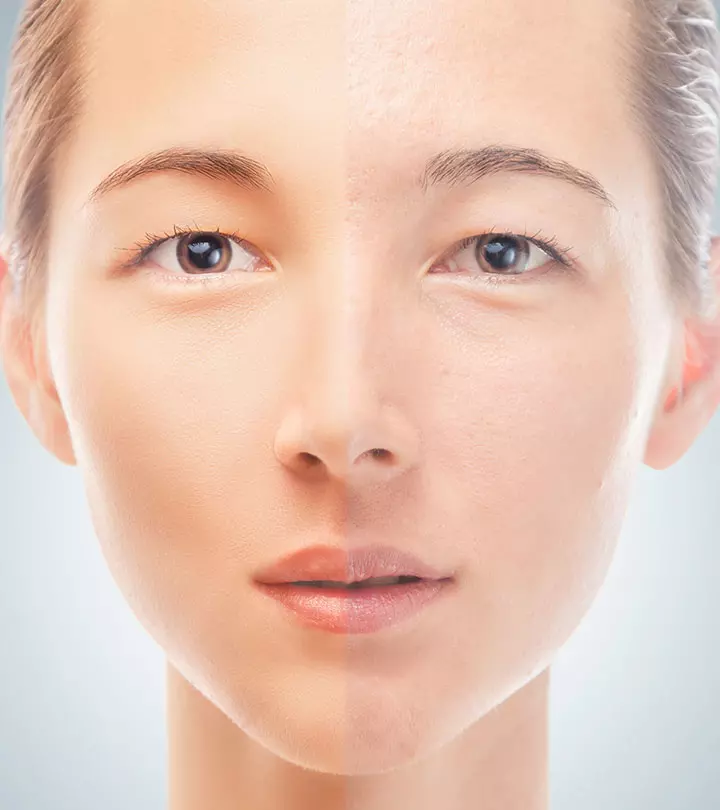
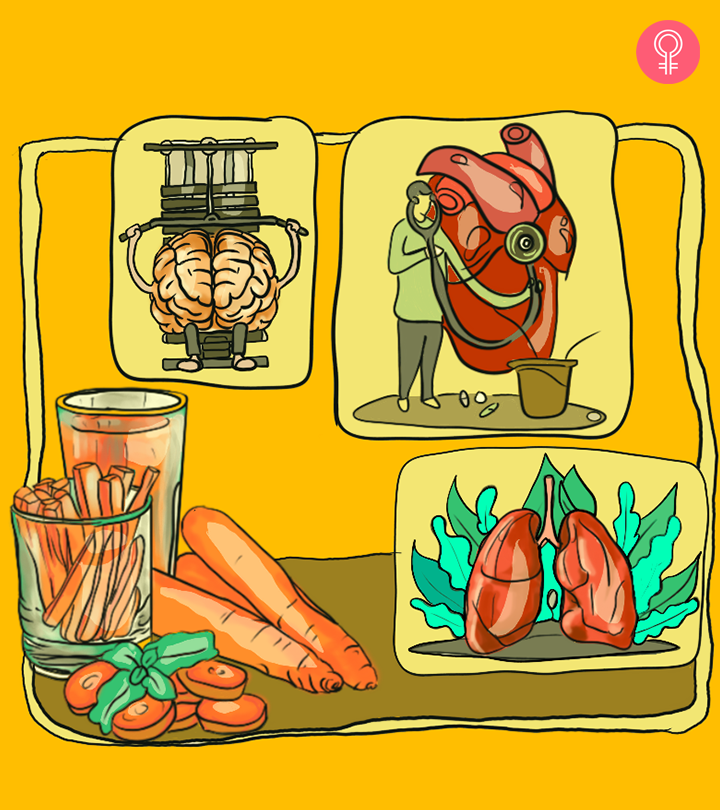

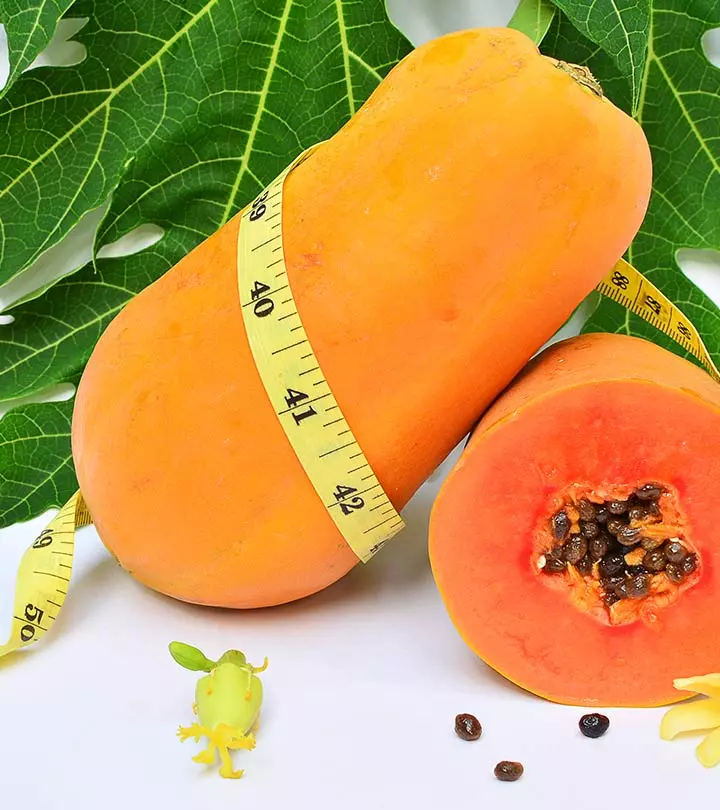
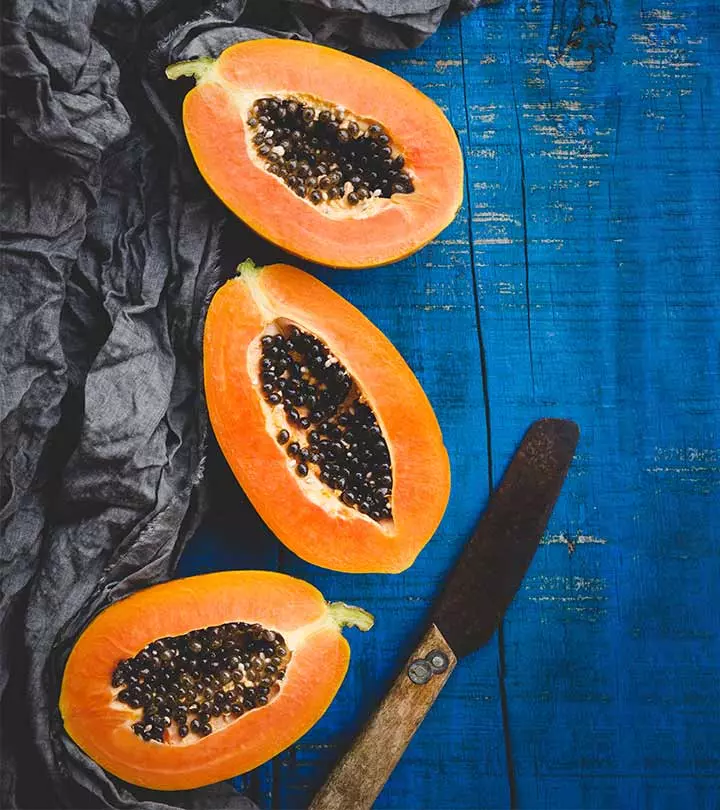
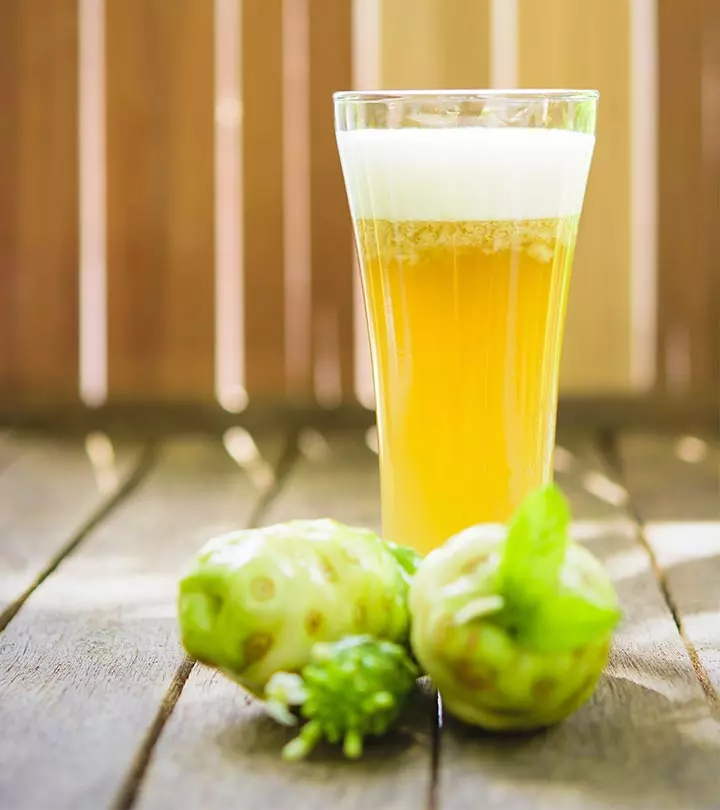
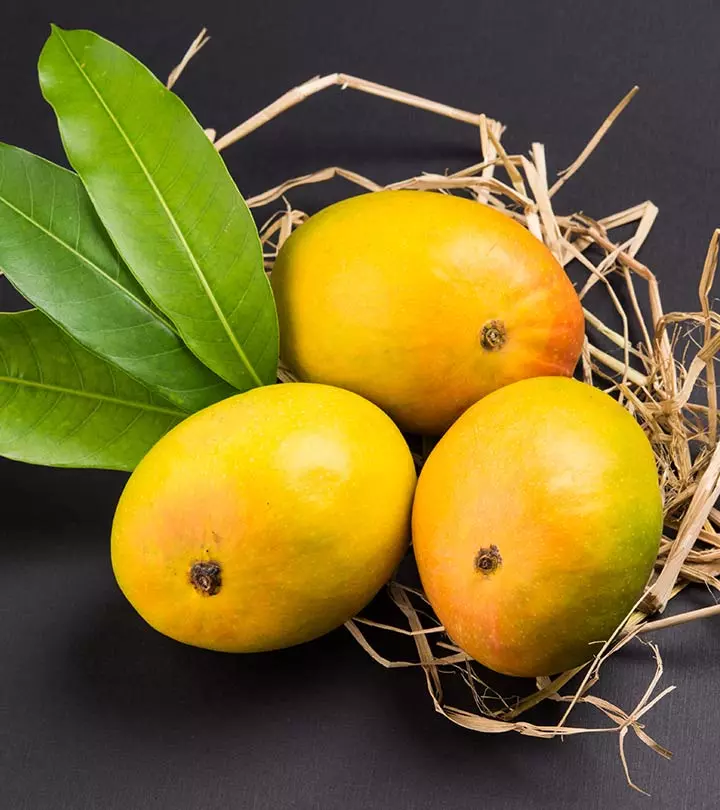

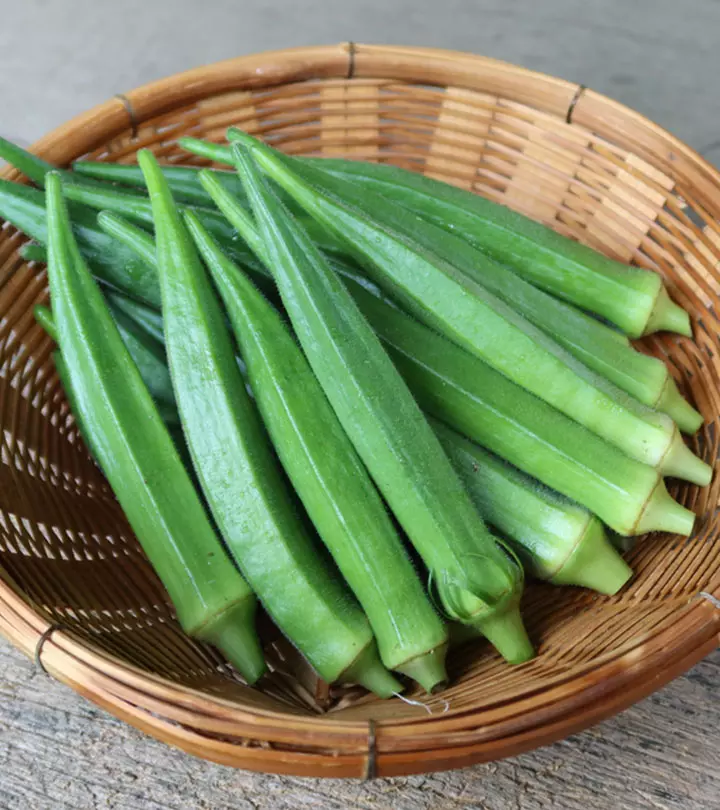
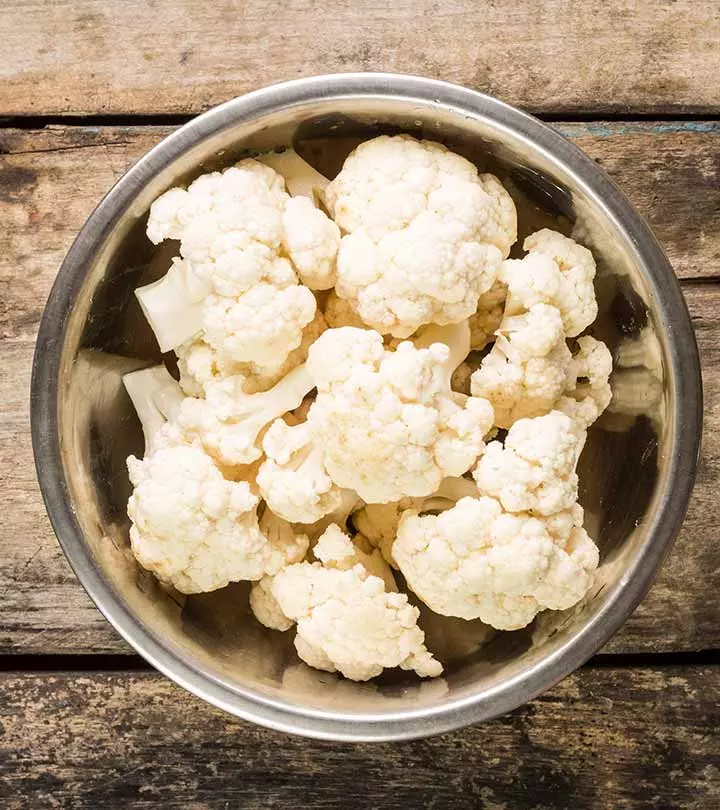
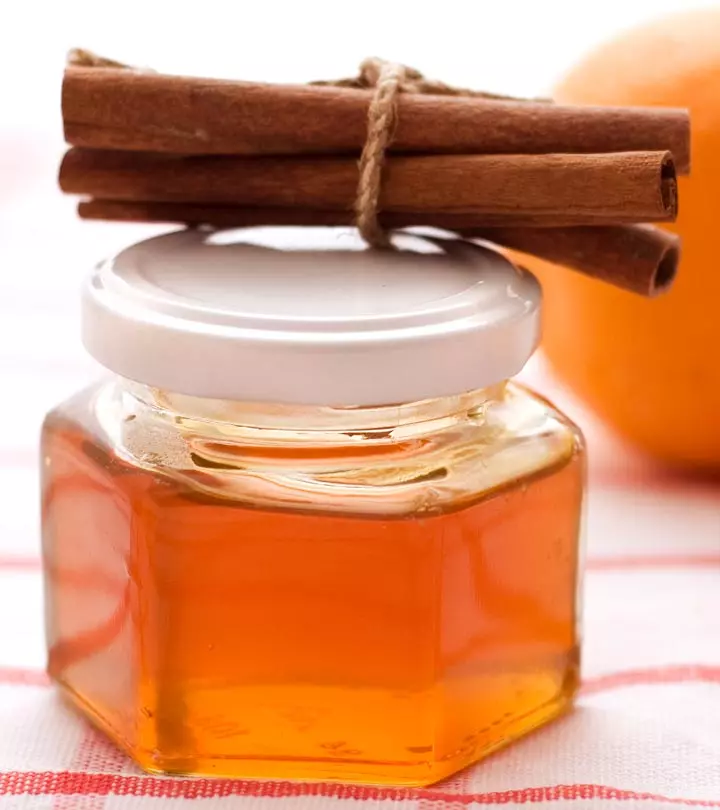
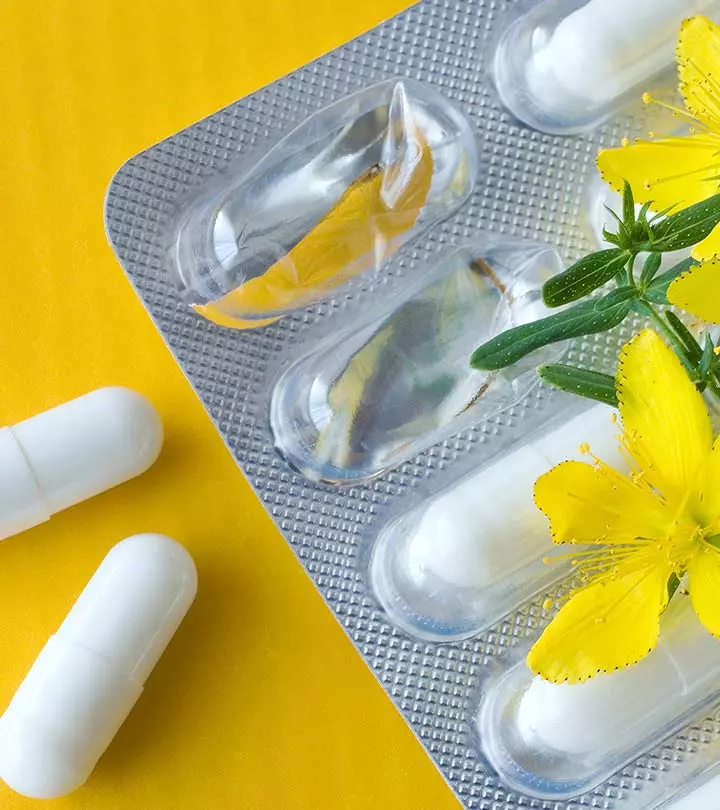
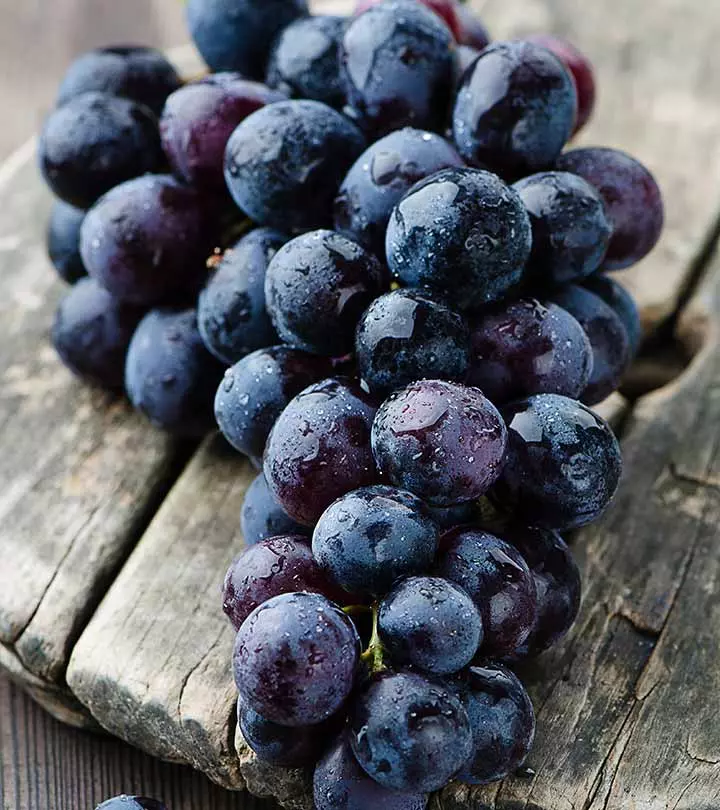
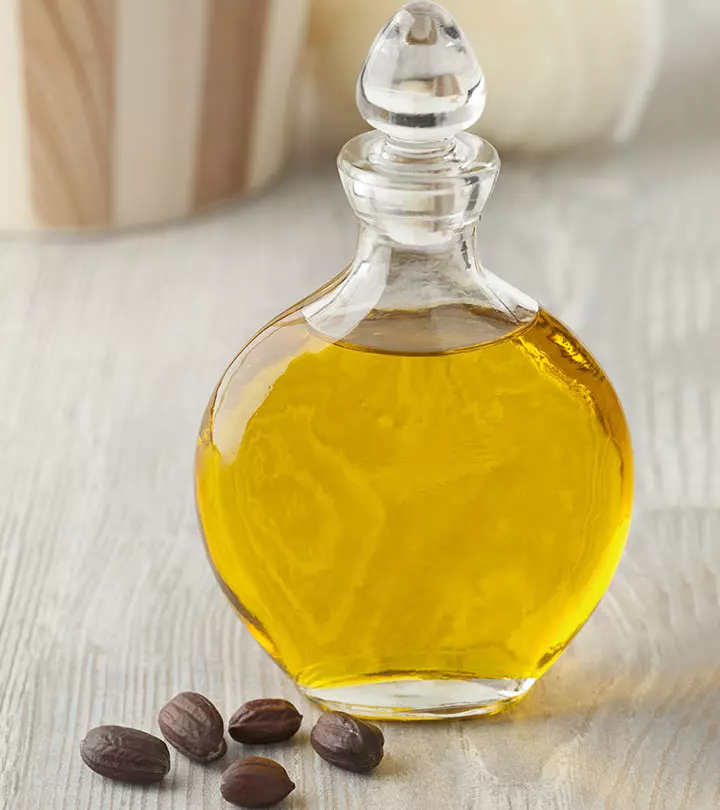
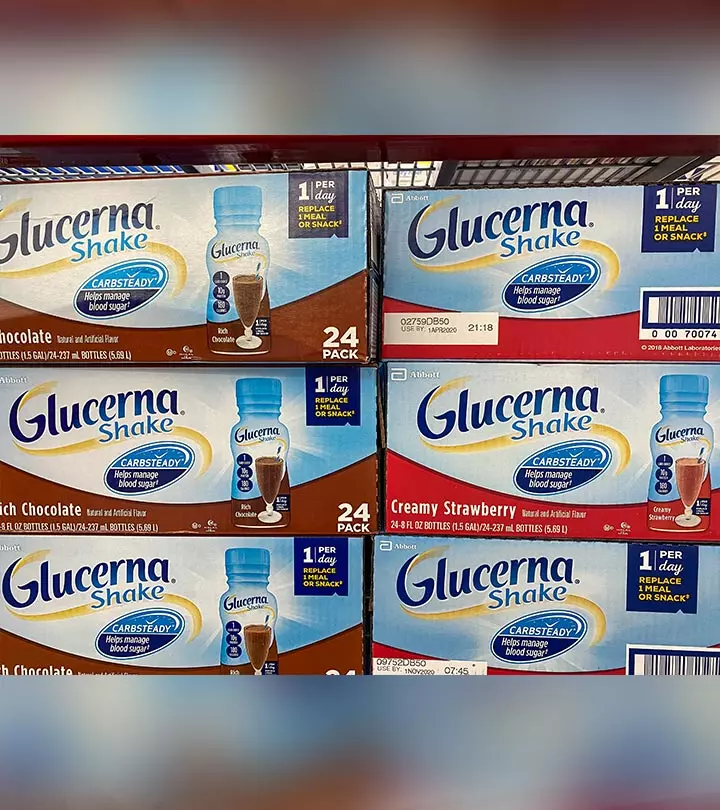
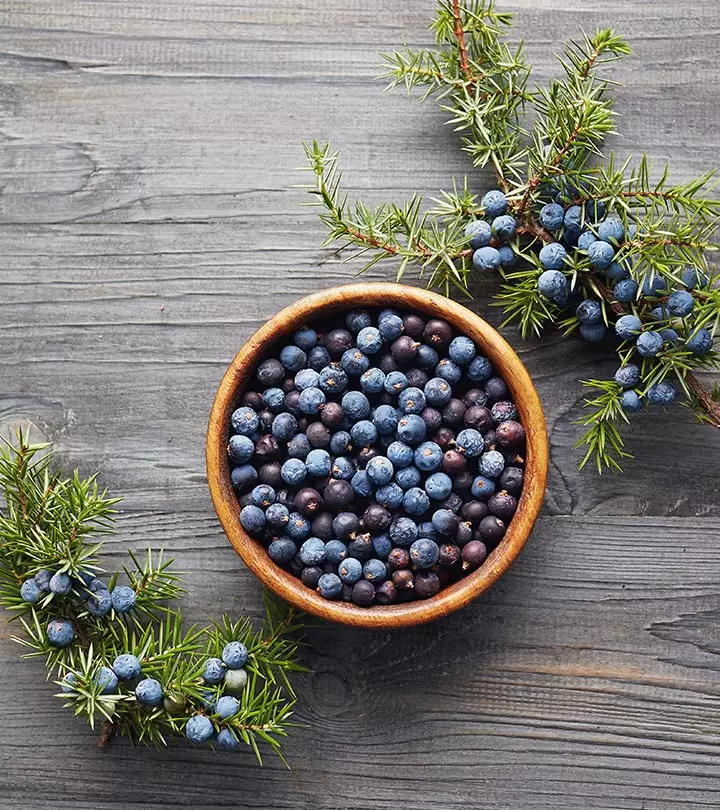
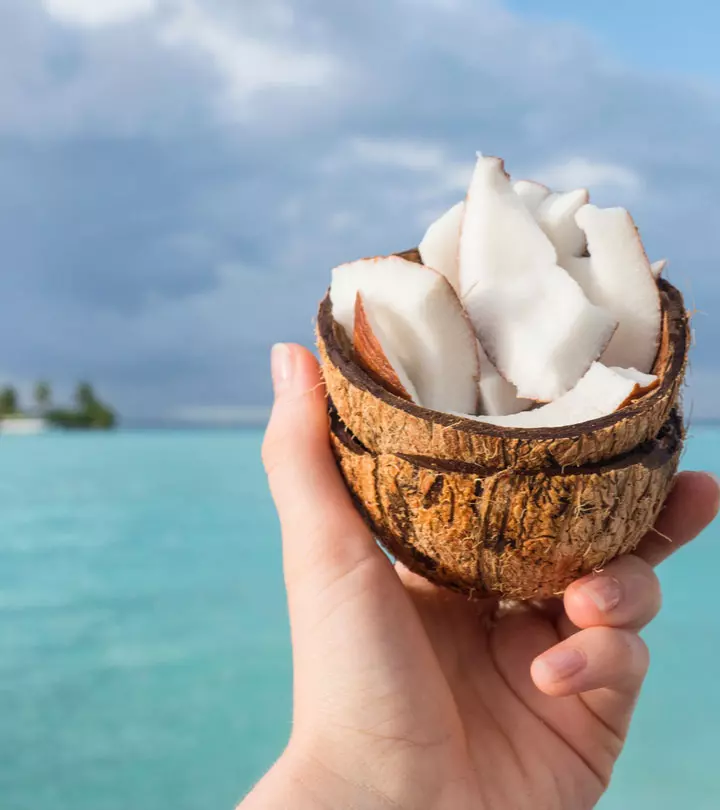
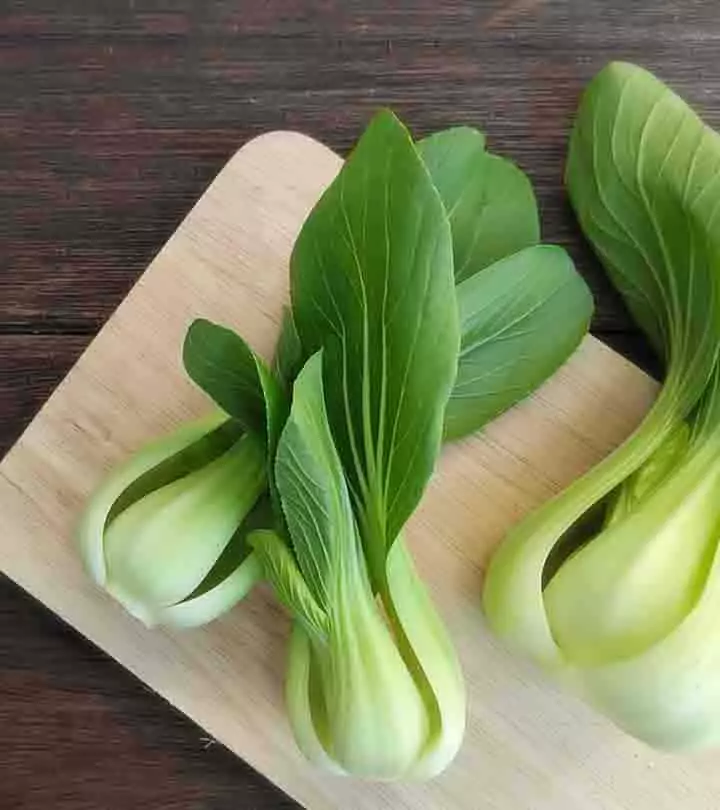
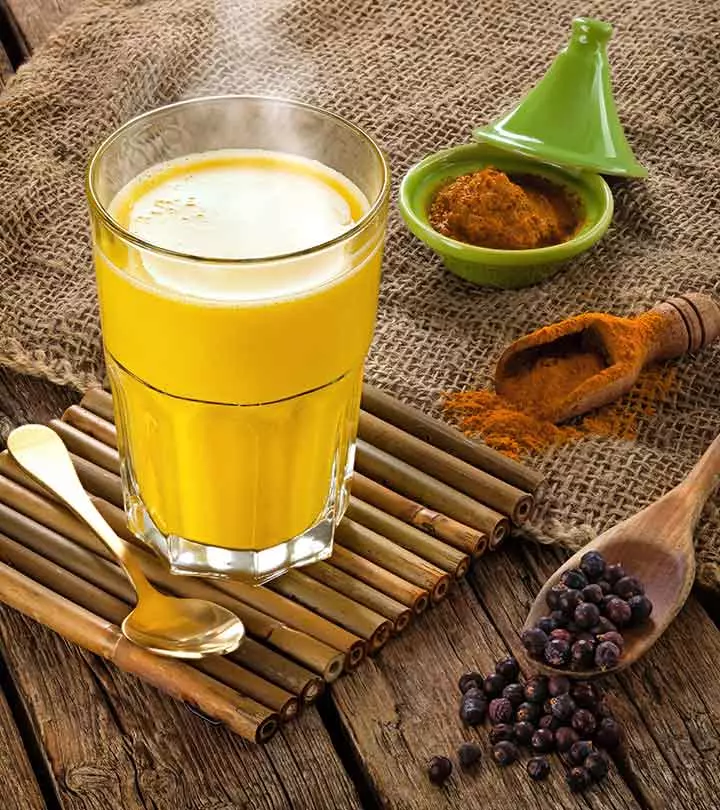
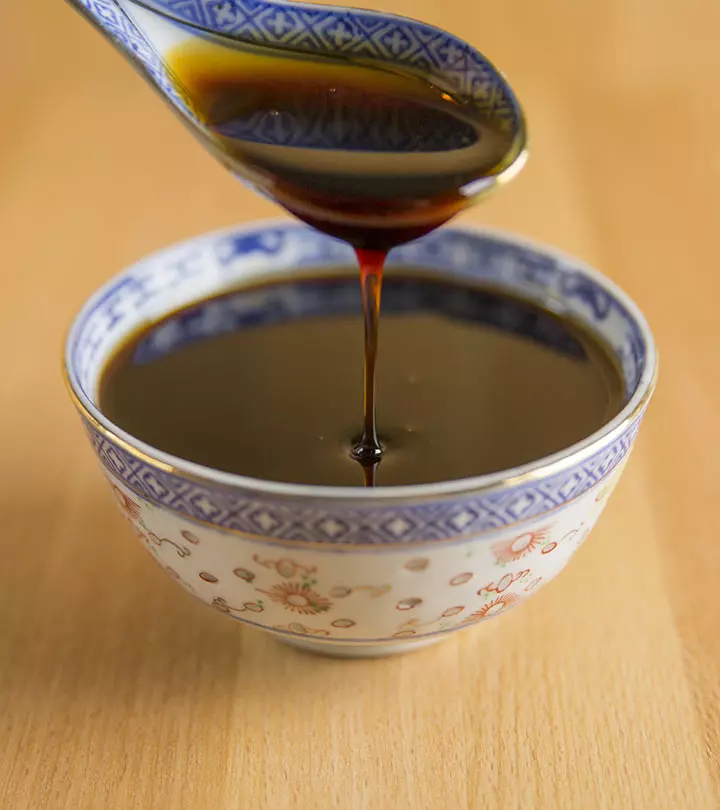
Community Experiences
Join the conversation and become a part of our empowering community! Share your stories, experiences, and insights to connect with other beauty, lifestyle, and health enthusiasts.